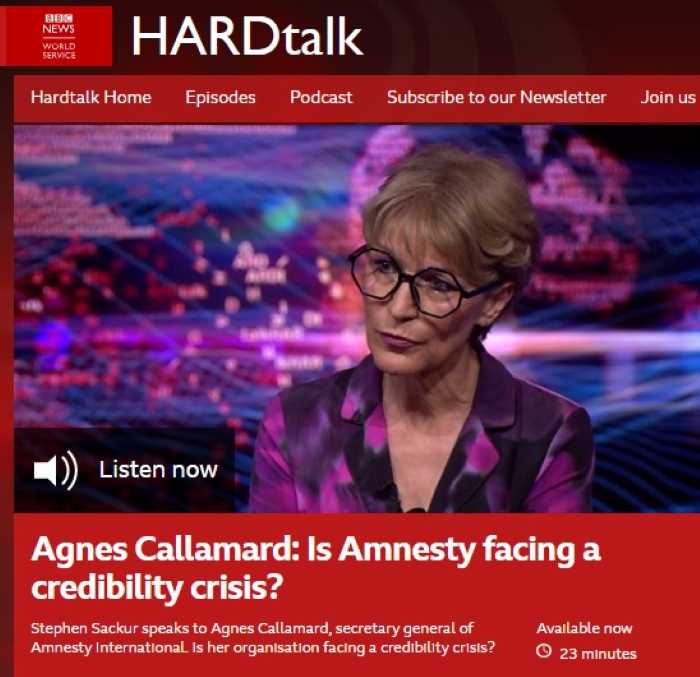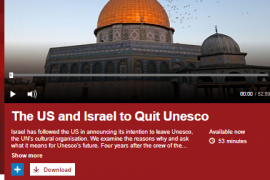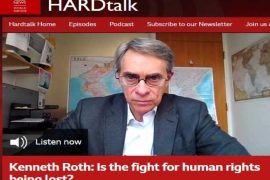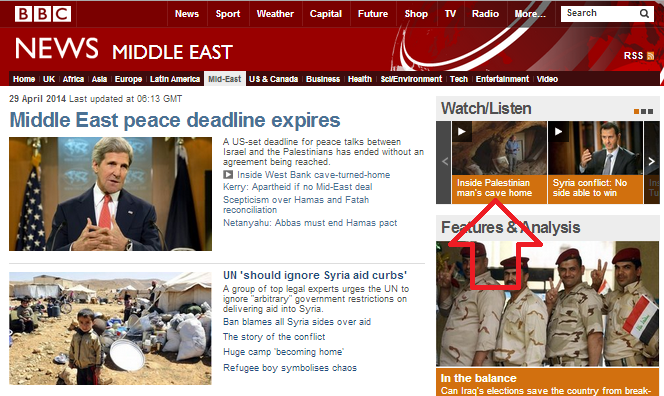On July 26th the BBC programme ‘Hardtalk’ aired an interview that could have been very informative and important for its audiences at home and around the world.
The televised version of that programme – presented by Stephen Sackur – appeared on the BBC News channel (here for UK readers) and the audio version was aired on BBC World Service radio (here). Its synopsis reads as follows: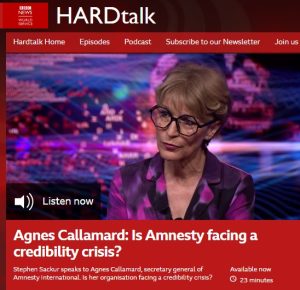
“Holding governments to account for their abuses of human rights is hard. It requires focused forensic investigation, impartiality and no little courage. For six decades, Amnesty International has been advocating for prisoners of conscience in the face of state repression. But in recent times it’s both broadened its focus and faced unprecedented criticism. Stephen Sackur speaks to Agnes Callamard, Amnesty’s secretary general. Is her organisation facing a credibility crisis?”
Over three minutes (13%) of that twenty-three-minute interview (from 14:47 in the audio version) related to Amnesty International’s repeated use of ‘apartheid’ rhetoric in connection with Israel. [emphasis in italics in the original]
Sackur: “Is it representative of your impartiality to consistently call Israel an apartheid state?”
Callamard: “It’s…eh…representative of the facts, you know.”
Viewers and listeners were not provided with any objective information concerning “the facts” and hence could not assess the veracity of Callamard’s claim.
Sackur: “Apartheid is, of course, blatant out and out systemic racism, so you’re in essence saying Israel is a racist state.”
Again, audiences were not provided with any background information (such as the fact that Israel’s efforts to combat terrorism have nothing whatsoever to do with the race of its perpetrators) which would help them form their own opinions about Callamard’s allegations.
Callamard: “Yes. The State of Israel is practicing a crime against humanity of apartheid against the Palestinian people. We have investigated those violations for four years. We produced this report in February 20…last year…on the…on the apartheid, calling on the State of Israel [unintelligible]…”
Sackur [interrupts]: “Well to be fair, not just one report; many reports accuse Israel of systemic apartheid in everything from the operation of its security forces in the occupied territories to its more recent use of surveillance technologies. You characterise it consistently as apartheid. But listen to the impact your reports have had inside Israel. For example, former senior figure in the government there, Yair Lapid. He said ‘Amnesty doesn’t call Syria – where the regime’s murdered half a million of its own citizens – an apartheid state or Iran or other murderous regimes around the world. It is only Israel’.”
Sackur’s presentation of that small part of the statement put out by Israel’s foreign ministry in late January 2022 does not help audiences understand Callamard’s subsequent introduction of the topic of antisemitism into the conversation.
Callamard: Look…ah…a) we…this is not the first time Amnesty International has used apartheid. We’ve also demonstrated apartheid in the context of Myanmar. We certainly denounce the massive crimes against humanity committed by the Syrian government. But the fact that we are criticising and denouncing the policies, laws and practices of the Israeli government does not amount to antisemitism. Of course antisemitism must be denounced. Of course Amnesty International will and does denounce it. We are also…”
Given that in 2015 the BBC did not report Amnesty International’s rejection of a motion to tackle rising antisemitism in Britain at its annual conference, it is perhaps not surprising that Sackur failed to challenge Callamard’s claims regarding her organisation’s record on that issue.
Sackur did not tell BBC audiences that, contrary to the impression given by the repeated use of the term “occupied territories” in this interview, AI’s 2022 report originally alleged that:
“This system of apartheid originated with the creation of Israel in May 1948…Dismantling this cruel system of apartheid is essential for the millions of Palestinians who continue to live in Israel and the OPT.” [emphasis added]
In other words, as far as AI is concerned, Israel’s ‘original sin’ stems from its very creation and its “dismantling” – i.e the denial of self-determination to the Jewish people; defined as antisemitism by the IHRA – is “essential”.
Neither did viewers and listeners receive any information concerning Agnes Callamard’s own 2013 promotion (still standing) of a false assertion concerning Israel before Sackur continued:
Sackur [interrupts]: “Do you think you get it proportionally right? I mean we started this interview talking about the many problems around the world. We could have mentioned specifically Myanmar or Ethiopia or a whole host of others.”
Callamard [interrupts]: “You picked. I did not pick. You picked.”
Sackur: “I’m just saying, when you consider the amount of resource, the amount of time that you devote to Israel-Palestine, do you think it is proportionate to the problems that we see in so many other parts of the world?”
Callamard: “Have you…has your producer looked at our reports on Myanmar? How many we’ve produced over the last few years? Far more than we did on Israel. Look, you know, we are focusing on Israel as…eh…eh…apartheid because it is a massive human rights violation that must be denounced. I was in Israel myself to launch this report. I have to tell you, I have never been in an environment where I confronted so much hopelessness and the absurdity of how apartheid is worked itself in the context of the occupied territories and Israel is mind boggling. I mean I just want…”
During that visit to Israel in 2022, Agnes Callamard and her colleague Philip Luther gave an interview to the Times of Israel’s Lazar Berman. As later noted by Shany Mor in relation to Luther’s promotion of the exact same talking point as Callamard uses in this Hardtalk interview eighteen months later:
“Anyway, as Luther is keen to point out, it is not the case that Amnesty has only accused Israel of apartheid. It also issued a report in 2017 accusing Myanmar of committing the crime of apartheid.
This is perhaps the biggest red herring in the entire interview. A comparison of the Myanmar report and the Israel report only serves to make Berman’s questions even more urgent and Luther’s answers even more inadequate.
The Myanmar report deals with specific policies of institutionalised discrimination and forcible population transfers in Rakhine State (one of 21 regions in the country) affecting a minority that comprises roughly 1 per cent of Myanmar’s total population. The Israel report casts the entire existence of Israel as a tainted enterprise. The very basis of Israeli society is a putative crime.
The Burmese government could conceivably implement each of Amnesty’s policy recommendations tomorrow and Myanmar would continue to exist. The recommendations proposed for Israel would end the existence of a Jewish state and leave its six million Jews vulnerable to mass murder and expulsion.
Another big difference: The claims against Myanmar will not be used to mobilise violence against ethnic Burmese around the world.”
Sackur however changed the subject at that point:
Sackur: “Alright, well you’ve made that point. Let’s move on because we don’t have much time left.”
Any serious examination of Amnesty International’s credibility, reputation and impartiality would have to provide audiences with the facts essential for putting the claims made by Sackur’s sole interviewee into their correct perspective. Any such examination would also have to address the relevant issue of the political motivations of Amnesty International and other self-defined ‘human rights’ organisations with which it collaborates.
With such information withheld from BBC viewers and listeners, all Sackur in fact achieved in this part of the interview was to provide Callamard with a stage from which to promote her obviously partial talking points concerning Israel.
Amnesty International was one of the leading NGO contributors to BBC content in 2022, as has been the case for at least a decade. The BBC has regularly promoted uncritical amplification of Amnesty International’s reports concerning Israel, including the one referenced in this interview:
UNCRITICAL AMPLIFICATION OF AI’S ‘APARTHEID’ SMEAR FROM BBC NEWS
It is therefore of all the more concern that Stephen Sackur did not ensure that his interview with Amnesty International’s secretary general was informative and challenging enough to contribute to audience understanding of the background to that once respected organisation’s spurious ‘apartheid’ campaign against Israel.

